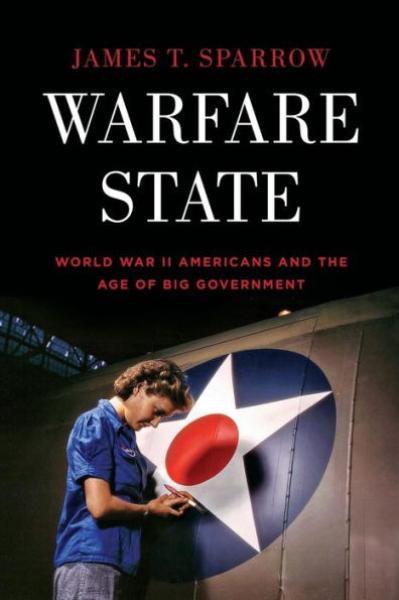Description
Warfare State shows how the federal government vastly expanded its influence over American society during World War II. Equally important, it looks at how and why Americans adapted to this expansion of authority. Through mass participation in military service, war work, rationing, price control, income taxation, and the war bond program, ordinary Americans learned to live with the warfare state. They accepted these new obligations because the government encouraged all citizens to think of themselves as personally connected to the battle front, linking their every action to the fate of the combat soldier. As they worked for the American Soldier, Americans habituated themselves to the authority of the government. Citizens made their own counter-claims on the state-particularly in the case of industrial workers, women, African Americans, and most of all, the soldiers. Their demands for fuller citizenship offer important insights into the relationship between citizen morale, the uses of patriotism, and the legitimacy of the state in wartime.
World War II forged a new bond between citizens, nation, and government. Warfare State tells the story of this dramatic transformation in American life.
Warfare State is one of the most important books on the United States to be published in some time. Sparrow is not the first scholar to argue that it was World War II, rather than the New Deal, that shaped the postwar consensus in support of a stronger, more active federal government. But this clearly written, concise, and yet comprehensive book makes the argument more forcefully and fully than others. Warfare State is a book that historians and students of contemporary American politics need to master; this is scholarship at its best.--Foreign Affairs
One finishes Warfare State with an appreciation of how beautifully wrought a piece of scholarship it is--meticulously researched, graceful written, and politically resonant.--History News Network
James Sparrow's wide-ranging and deeply-researched book helps us to see modern America anew. Warfare State deftly shows how wartime reconfigurations of the U.S. economy, society, and political landscape fueled the explosive growth of centralized authority and set the contours of today's virulent debates about the role of the federal government. A brilliant debut.--Elizabeth Borgwardt, Washington University in St. Louis
When did the American state become a leviathan? In this brilliant book, James Sparrow points to World War II rather than New Deal as the critical moment when the U.S. government entered the lives of its citizens in myriad and profound ways, revolutionizing American politics in the process. Warfare State tells this complex story more vividly, comprehensively, and acutely than any previous account. It also provides an indispensable guide to the battles over government legitimacy and power that so convulse America today.--Gary Gerstle, Vanderbilt University
In challenging the conventional wisdom of a weak American state, James Sparrow brilliantly connects bureaucratic developments in Washington to political culture at the grassroots, showing how the mobilization for World War II permeated everyday life and transformed the meanings of national citizenship. This book deserves a prominent place among the seminal works of modern American political history.--Matthew Lassiter, University of Michigan
The Warfare State is a potent blend of social and cultural history that sheds new light on one of the most important political moments in twentieth-century American history. Deploying a remarkable range of sources, Sparrow delves into the attitudes and practices of key clusters of citizens that range from workers to ethnic and racial groups, from front line soldiers to those producing military supplies back home. What emerges is a perspective that will no doubt form the basis for an important reinterpretation of the late New Deal years, World War II, and the Cold War society that grew out of it.--Brian Balogh, University of Virginia
This beautifully written, wonderfully insightful book shows how World War II facilitated a huge expansion of federal government with little dissent. A powerful melding of nationalism and liberalism, of obligation and rights, convinced a nation of government skeptics to fight, work, and pay taxes to a vastly larger, more intrusive, but newly legitimate state. A must read for all interested in the nature and scope of American governance.--Andrea Louise Campbell, Massachusetts Institute of Technology
[An] important new book....Rarely is so comprehensive an argument delivered in so concise a manner...one finishes Warfare State with an appreciation of how beautifully wrought a piece of scholarship it is--meticulously researched, gracefully written, and politically resonant.--HNN.com
Warfare State is one of the most important books on the United States to be published in some time...[A] book that historians and students of contemporary American politics need to master; this is scholarship at its best.--Foreign Affairs
Sparrow uses both primary and secondary sources to explore important questions about the growth of government that are still pertinent in today's world.--CHOICE
Sparrow's book is an insightful blend of cultural deconstruction and abstract political analysis that examines the point at which state authority touches and intrudes on everyday life. His sources are tremendously rich and varied, and Sparrow shows a deft touch with popular culture, such as an inventive discussion of the 1938 War of the Worlds radio broadcast, whichhe uses to depict a society on edge in anticipation of war...[A]n ambitious book that is essential to understanding the world we live in today.--Journal of American History
Product Details
- Oxford University Press, Brand
- Jan 1, 2013 Pub Date:
- 019993035X ISBN-10:
- 9780199930357 ISBN-13:
- 336 Pages
- 9.1 in * 6.1 in * 1 in Dimensions:
- 1 lb Weight:




